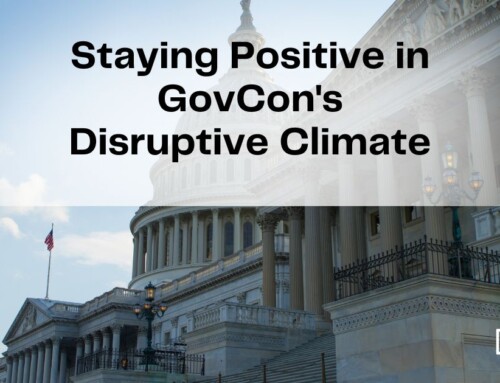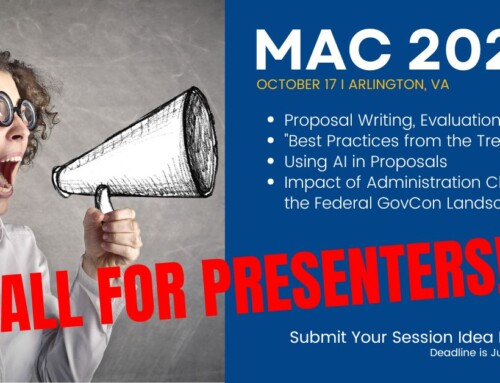by Mary Claire Tracy, CF APMP
As proposal management professionals, we have ample opportunities for continuing education and professional development. We can attend conferences, online courses, workshops, seminars, and so on; the list is endless. Often, however, we don’t recognize one of the most valuable learning resources we have—each other. Learning how to tap the knowledge and experience of our colleagues certainly helps us to broaden our viewpoints and learn new approaches, but it’s also great for business! The more we vary our team members, the more we can learn from each other. A diverse team with a wide range of experience offers a valuable learning resource.
Often, we become so concerned with delivering a winning proposal that we can lose sight of the learning opportunities right in front of us. We can fall into “tried and true” practices, repeatedly seeking input from the same individuals with a specified range of backgrounds for proposal after proposal. For example, some organizations may exclusively seek writers with strong technical backgrounds for their teams. This may produce a proposal that answers RFP requirements with comprehensive and accurate technical content, but the team may struggle to develop the necessary message to distinguish the solution from that of other bidders. Imagine, however, that we bring in some writers with marketing backgrounds. These writers will not be as well-versed on the technical aspects of the solution, but they can bring in extremely valuable insights to help hone the message to make the proposal stand out. In addition, by collaborating with each other, writers from both backgrounds actually expand their capabilities—the technical writers learn some new, marketing-based approaches, and the marketing writers gain some subject matter expertise.
This is just one example of how we can expand our knowledge by working with a diverse team. In addition to the usual mix of capture, business development, SME, and proposal management types, consider looking beyond established titles and bringing in people with differing areas of expertise:
- Process Management—these individuals can offer expertise in all manner of efficiencies to streamline operations and billing. These are sometimes proposal managers or business development professionals, but this expertise can come from anywhere.
- “Wonks”—have their finger on the pulse of the current zeitgeist. They know what’s trending, what gets the greatest consumer response, and how to capture audience imagination. These individuals may be marketing or social media experts, but they can come from a variety of fields.
- Practical, or “On the Ground” Experts—provide valuable practical information. While SMEs can provide detailed high-level knowledge regarding a particular project, system, or initiative, practical experts may have experience with the actual everyday operation, providing insight into user interfaces or customer experiences.
- Regulatory Experts—individuals with compliance or regulatory backgrounds can help to ensure that the proposal addresses all RFP requirements because they are often trained to think like evaluators.
- Formal Writing Experts—have backgrounds primarily in English, rhetoric, and writing. They can help us to structure our arguments and evaluate our messages for cohesiveness and logic, make sure that our proposal has correct grammar and spelling, and facilitate adherence to style guidelines. Grammatical mistakes and inconsistencies can frustrate the reader, change meanings, and distract from our message.
Building a diverse team, however, requires effective planning and strategizing. First, we have to identify the desired skills or experience for our team members. We can employ best practices for this, such as holding regular meetings to determine which areas of expertise we need. We can also evaluate the performance and effectiveness of recent teams. Readers and other stakeholders can also provide valuable input. This should be an ongoing process as we improve our effectiveness and approach.[intense_blockquote width=”33%” rightalign=”1″]”Often, we become so concerned with delivering a winning proposal that we can lose sight of the learning opportunities right in front of us.”[/intense_blockquote]
The next challenge is finding effective team members. Some desired skills may seem rather well-defined and part of standard job descriptions, but some may not. When recruiting, it proves useful to look beyond the resume and job description keywords. We may discover that the writer that we are interviewing is an avid wonk with an extensive knowledge of cultural trends. Likewise, we can work within our own organization to identify “hidden skills” for our colleagues…that proposal manager may be a whiz at process management or have regulatory experience.
Although some organizations may have a large pool of talent from which to choose, others may not. Some proposal operations have a team of one. This is where we may have to reach outside the department to find experts in other areas of the company. Collaboration is key here, and it can really pay off. The proposal benefits from the expertise, and individuals from other areas have an opportunity to learn about the proposal process. This can promote a wider understanding among colleagues and a stronger commitment to the overall mission.
Collaborating with a diverse team can help us to increase our subject matter and procedural knowledge, of course. It can also help us to improve as professionals in more significant ways, however. Sharing ideas and entertaining new approaches helps to drive us out of our comfort zones; it helps us to become more flexible, responsive, and able to produce winning content.




Leave A Comment